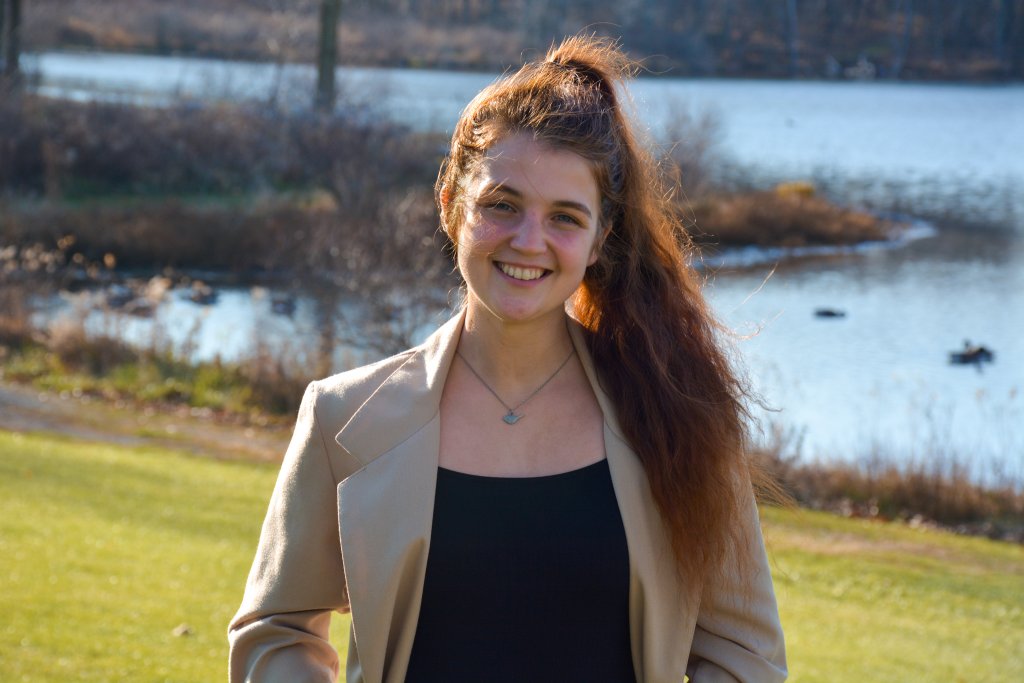Emma Zuercher ’23

When Emma Zuercher, Apple Creek, Ohio, visited Merry Lea Environmental Learning Center during freshman orientation fall 2019, she heard about cheesemaking, soapmaking and other hands-on opportunities through Merry Lea’s programs. She grew up canning and gardening with her family, and sometimes helps her sister with her small soapmaking business. She remembers thinking how great it would be to continue the hobbies and interests she’s already passionate about in environmentally friendly ways.
“My driving force is learning, so if I have the opportunity to learn or try something new, I’m on it,” she said.
However, Emma was not very familiar with the term sustainability when she returned to Merry Lea a year later for the Sustainability Leadership Semester (SLS).
When she conducted research and projects for her sister’s soapmaking business, she now sees this seemingly random collection of skills as very valuable. “[My sister and I] talked about and were in tune with ideas on how certain projects could be good for the environment, but I didn’t know that was sustainability.”
Her initial familiarity with the term sustainability was with greenwashing advertisements. Greenwashing refers to marketing strategies used by corporations to deceptively describe their products or policies as environmentally friendly.
Not knowing what was or was not considered authentically sustainable, the term and practices of sustainability felt elusive to Emma.
Emma is majoring in sign language interpreting at Goshen College and first heard about the SLS from an alum of the program and fellow sign language interpreting major.
She originally planned to go to Ecuador this fall for Goshen College’s Study-Service Term (SST), which are international study programs where students live with host families, take classes and serve in the community. However, that program was canceled due to COVID-19 travel restrictions and public health concerns.
Participating in intercultural classes or experiences is a requirement for each Goshen College undergraduate. This is the first year Merry Lea offered the SLS as an option for fulfilling these intercultural requirements.
Emma and one other student signed up for the SLS to attain those credits.
Even though she’s not learning a new language in Ecuador, Emma described how the SLS allows her to focus on the nuances of the English language in a way she never previously encountered.
“This still feels like an immersive language experience,” she said. “There are many ways of using English, and many languages of English. For example, there are many ways to talk about policy, sustainability and the environment, but those things weren’t accessible to me before.”
The SLS helped Emma grasp the scientific language about climate change, ecosystems and environmental science. Understanding sustainability and learning the vocabulary of the subject helps her be a better American Sign Language interpreter.
“Interpreting is different than translating. How can I interpret things about the environment if I don’t know what you’re talking about?” She explained. “It feels good to have that language and understanding. It’s more meaningful than using language I don’t understand using.”
However, Emma emphasized that the language of sustainability should be accessible to everyone, not laden with scientific jargon. During various field trips and classes, Emma noticed how the same environmental ideas can be talked about in different “languages” to appeal to or be understood by different people groups.
The first time she noticed these different languages of sustainability was when Billie Warren, a member of the Pokagon Band of Potawatomi, came to Merry Lea to lead a hike and talk to the SLS students.
“She and we were talking about the same ideas…how to take care of the land, valuing the land, our relationships with plants,” Emma said. But Warren’s description of these interactions from an indigenous perspective was new: she described the world as one organism of many. “We are all part of the whole,” Emma explained.
Emma applied this new framing to her background knowledge of science and daily life.
“[How I fit into] that one organism of many is a base of understanding for how to interact and conduct my life…How to make decisions. [In the SLS] we talk a lot about values and introspection, which I wasn’t expecting – I expected only science – but these things overlap and have to come together for the most holistic approach.”
Emma described having an “Aha moment” early on in the semester.
“Sustainability isn’t just environmental, like plants and animals. It applies to relationships and communities. It’s the full picture.” She describes interactions with people, plants, and food, and between science and communities as all important and must work together in order to succeed.
Emma’s interest in linguistics translates not only to her major, but informs what she takes away from the SLS. She has a keen desire to communicate with those who were like her at the beginning of the semester, those with little knowledge of sustainability, and inform them how sustainable actions can be incorporated into their daily life.




